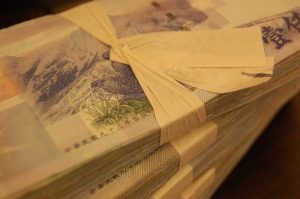Taipei prosecutors on Monday charged four legislators and one ex-lawmaker in corruption cases that have drawn attention to Taiwan’s absence of strong regulations governing lobbying.
Four of the charged politicians are accused of taking bribes from Lee Heng-lung, former chairman of Pacific Distribution Investment Co., as he waged a legal battle over ownership of a major department store chain.
Legislators Chen Chao-ming and Sufin Siluko of the Kuomintang (KMT), Su Chen-ching of the Democratic Progressive Party (DPP), and former New Power Party (NPP) legislator Hsu Yung-ming were indicted by Taipei prosecutors for allegedly taking bribes from Lee in violation of the country’s anti-corruption act.
Lee was also indicted, as were five current and former legislative aides.
Independent legislator Chao Cheng-yu was separately indicted for allegedly taking bribes from two funeral service companies who wanted to build a cemetery in a national park.
Lee had sought support from lawmakers as he fought to regain ownership of the department store chain Pacific SOGO after it received an injection of capital from Far Eastern Group that would make that conglomerate the majority shareholder.
Lee had secretly visited the lawmakers without legally registering with authorities, an interior ministry official told the Taipei Times on Monday.
The official, who asked to remain anonymous, criticized Taiwan’s poor record of regulating lobbying despite the passage of an act to do so in 2007. The Lobbying Act requires interest groups to register visits to legislators and other government officials. In practice, however, few lobbyists bother to do so.
The interior official said 427 cases of lobbying government officials have been registered since the act was passed in 2007.
The law calls for officials to report all lobbying activities within seven days, threatening fines if they fail to do so. However, one legislator told the Taipei Times businesses prefer to skip the process so they can lobby politicians in secret, especially when businesses are owned by family members of legislators.
Since the passage of the act, zero fines have been issued for violations of the law.
Members of Taiwan’s Control Yuan, the government’s ombudsman branch, said they would investigate why the Lobbying Act was passed without strict enforcement of registration requirements.
At present, Taiwan’s weak regulations create an environment permissive of graft, both in local and national politics.
Chen Shui-bian and Ma Ying-jeou, the two presidents who preceded current President Tsai Ing-wen, both faced corruption charges after their stints in office.
The Lee cases could serve as an opportunity to set a strong precedent in criminalizing bribery, deputy chief prosecutor Chen Yu-ping said Monday.
The cases “have resulted in political turmoil, and immense damage to our constitutional order and liberal democracy,” she said. “Therefore, we have asked the court to mete out heavy punishment with the strongest sentences as a deterrent.”
According to prosecutors, the bribes were allegedly paid so the legislators would pressure Taiwan’s Ministry of Economic Affairs to amend an act that could retroactively invalidate Far Eastern’s capital injection, allowing Lee’s Pacific Distribution Investment to maintain control of Pacific SOGO.
Taiwan’s Supreme Administrative Court had already ruled that Far Eastern Group was the rightful owner of Pacific SOGO.
The legislators “allegedly willingly engaged in corrupt activities from 2012 to the time of their arrest, taking bribes to sell their power as legislators, turning into servants of businessman Lee Heng-lung, while abusing their power as legislators to hold public hearings, and use negotiation sessions, budget reviews and legislators’ interpellation periods to intimidate and threaten government officials, to reach the decision desired by Lee Heng-lung,” the prosecutors’ office said in a statement.
Su, Chen, and Liao will remain in detention in Taipei, where they’ve been detained since August 3.
Chao, the independent legislator charged with taking money from funeral service companies, has also been detained since August.

































